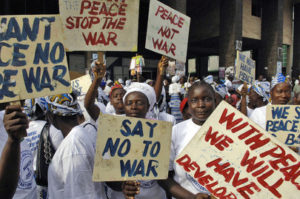 The International Center on Nonviolent Conflict invites interested authors to submit proposals for writing case studies on the interplay of civil resistance (CR) and peacebuilding (PB) strategies.
The International Center on Nonviolent Conflict invites interested authors to submit proposals for writing case studies on the interplay of civil resistance (CR) and peacebuilding (PB) strategies.
These case studies are expected to refer to the analytical framework developed by Veronique Dudouet in the ICNC Special Report “Powering to Peace: Integrated Civil Resistance and Peacebuilding Strategies” (see Table 1 below) and to provide illustrative and specific examples from conflict events to demonstrate how civil resistance and peacebuilding strategies worked together or separately in four identified phases of violent conflict: latent; overt; settlement and post-settlement.
The proposal submission deadline is October 15th, 2017.
Submit your proposal online here
Prospective applicants are strongly encouraged to review the ICNC Special Report “Powering to Peace” before submitting their proposals.
ICNC aims to commission up to five case studies depending on the relevance and strength of the submitted proposals.
Case Studies on Civil Resistance and Peacebuilding
Case studies that could potentially offer a wealth of relevant information to discuss the intersection between peacebuilding and civil resistance strategies in different stages of conflict include:
- The anti-Apartheid struggle in South Africa and the ensuing democratic transition;
- Peace zones in the Philippines;
- Peace communities in Colombia or ongoing nonviolent organizing and mobilizations in support of the implementation of the provisions of the Havana peace agreement;
- Mali in the early 1990s that witnessed an unarmed pro-democratic mobilization and negotiated process with armed rebels;
- The end to the civil war in Liberia in 2003 and the subsequent transition out of violent conflict;
- Insurrection in Nepal prior to 2006, the civil resistance that ushered in the transition of government in 2006, and the post-transition dynamics;
- The independence struggle and post-independence settlement in East Timor;
- Egypt before, during and after the 2011 revolution;
- Tunisia before, during and after the 2011 revolution;
- Afghan communities’ autonomous organizing and peaceful resistance against the Taliban;
- The end of civil war in Guatemala up until the popular uprising against corruption in 2015;
- Burkina Faso’s mass based civilian mobilization against a long-term dictatorship in 2014 and later against the military junta.
We also welcome proposals for an in-depth analysis of other cases of conflicts in which civil resistance and peacebuilding strategies might have played a role.
Once selected, the authors will have 75 days to complete a 9,000-10,000 word (excluding footnoting, appendixes, bibliography) study that analyzes civil resistance and peacebuilding strategies while referencing a specific, conflict-related, empirical case. After a successful peer-review assessment and a completion of needed revisions, the study will be published by ICNC and will accompany its released special report “Powering to Peace.”
Joint-author Proposals
We will consider single-author proposals, but our preference is for jointly-submitted (by at least two authors) proposals, in which the authors complement each other’s scholarly expertise with field or practitioner-informed experience. Case studies should include practical applications of strategies of peacebuilding and civil resistance in resolving, transforming or containing a violent conflict.
Proposals should be submitted online and are not to be longer than 1,200 words. References, tables, footnotes and appendices do not count against this word limit. Please do not send complete papers.
Criteria for Proposal Selection
Relevance:
- The proposal integrates the analytical framework from the ICNC Special Report on peacebuilding and civil resistance strategies (See Table 1 below) into the analysis of a specific case study
- The selected case study highlights a political instability in which civil resistance and peacebuilding strategies can be identified and were deployed in a single phase or across various stages of conflict development (latent; overt; settlement and postsettlement- for more see Table 1 below and the accompanying special report) and the interplay and impact of both strategies can be thoroughly described and evaluated
- the selected case study looks into a single, country-specific conflict (rather than conflicts across countries) in a defined time frame and identifies various stages in which a conflict developed and different domestic actors that devised and deployed peacebuilding and civil resistance strategies to address and mitigate violence. Support by external parties for domestic actors and their peacebuilding and civil resistance strategies can also be evaluated.
Significance:
- Initial findings included as part of the proposal highlight important aspects of civil resistance and peacebuilding strategies in all four, or in most, conflict stages (as outlined in Table 1) of a selected case study
- Initial conclusions of the proposed study suggest a potential rich array of practical takeaways and lessons-learned for activists and organizers, domestic civil society organizations, and the international policy and development communities
Knowledge:
- The authors demonstrate empirical and analytical knowledge of their identified case as well as generic knowledge of conflict studies, including a sound understanding of the differences between civil resistance and peacebuilding strategies. Prospective applicants are encouraged to consult the ICNC Resource Library and ICNC Academic Online Curriculum if they require further background on the field of civil resistance
Coherence and clarity of language:
- The proposed structure of the future study is logical and clear
- The language is not overly academic and is accessible to a professional, but non-scholarly, audience
Honorarium
ICNC offers a $2,000 honorarium for completed multi-authored publications and $1,000 for completed single authored publications.
Submit your proposal online here
Table 1: Conflict transformation strategies: A comprehensive staged approach. Source: Veronique Dudouet, “Powering to Peace: Integrated Civil Resistance and Peacebuilding Strategies,” ICNC Special Report, 2017, p. 31.